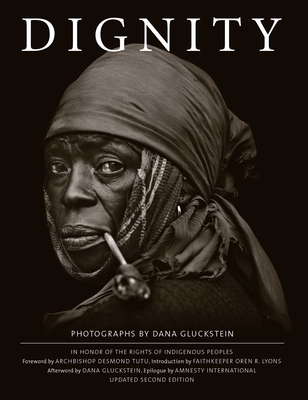
Gluckstein, Dana
product information
description
s us to truly see, not just appearances, but essences, to see as God sees us, not just the physical form, but also the luminous soul that shines through us." -NOBEL LAUREATE, ARCHBISHOP DESMOND TUTU IN THE FOREWORD The updated edition of Dana Gluckstein's iconic book, DIGNITY: In Honor of the Rights of Indigenous Peoples, provides urgency and a contemporary focus to the worldwide movement against racial injustice in which DIGNITY continues to play an important part. It includes new images of Native Americans and Moroccan Berbers as well as a new epilogue from Amnesty International, "Freedom from Violence" calling for the United States to take action against rape and assault of Native American and Alaskan Native women. The first edition of DIGNITY, a three-time winner of the International Photography Awards, helped create a turning point for the Obama administration to adopt the UN Declaration on the Rights of Indigenous Peoples - a historic milestone - in association with Amnesty International for their 50th anniversary. The UN Declaration, whose full text is reproduced in DIGNITY, is the most comprehensive global statement of the measures every government must enact to ensure the survival and well-being of Indigenous Peoples. It has empowered a worldwide movement of Indigenous Peoples to assert stewardship of the land, air, and water. Gluckstein spent three decades in the Americas, Africa, Asia, and the Pacific creating more than 100 black-and-white, duotone portraits that appear in DIGNITY and express the theme of "tribes in transition." In the decade since DIGNITY first appeared, Gluckstein's concerns over the treatment of Indigenous Peoples and her commitment to fighting on their behalf have only intensified. "DIGNITY is a call to action against racism," states Gluckstein. In the book's introduction, Native American Faithkeeper Oren R. Lyons reveals the roots of racism in the medieval Catholic Church and its Doctrine of Discovery that condemned Indigenous Peoples as subhuman to be treated like animals - the justification for their conquerors to steal land and enslave the inhabitants. Gluckstein intends the new edition will be as consequential as the original, this time in spurring action on behalf of Native American and Alaskan women. More than one in three Native women will be raped at some point in their lives. Sexual assault is so common in these communities that many Native American and Alaska Native women don't know any women who haven't experienced the trauma. In addition, many perpetrators go unpunished. Gluckstein sees DIGNITY's second edition as contributing to the current effort to insure these women receive adequate post-rape care mandated by the U.S. Tribal Law and Order Act - Sexual Assault Protocols and the UN Declaration. "I believe in the power of images to shift consciousness." "DIGNITY (the book and museum exhibition) is a multifaceted, many-layered project that captures the collision of modernity and tradition, globalization and indigeneity with grace, elegance, and profound humanity." -JILL DEUPI, CHIEF CURATOR OF THE LOWE ART MUSEUM
member goods
No member items were found under this heading.
Return Policy
All sales are final
Shipping
No special shipping considerations available.
Shipping fees determined at checkout.







